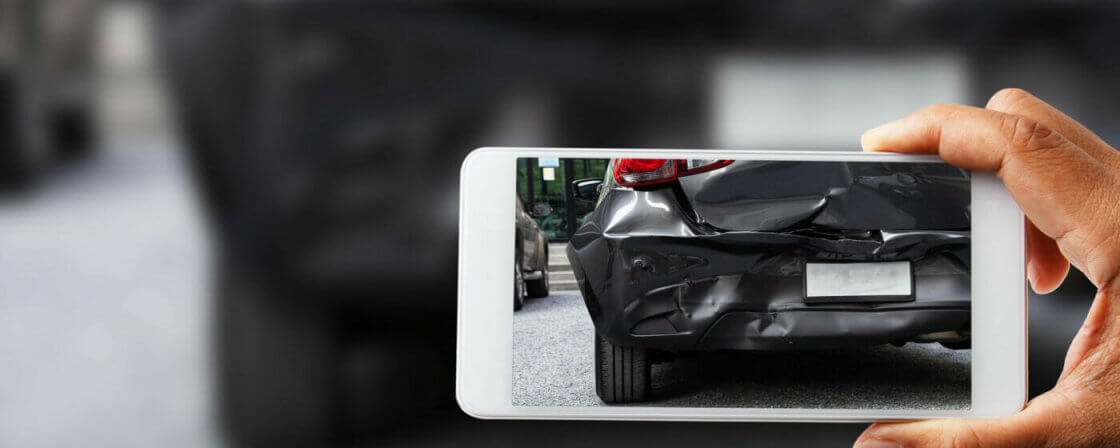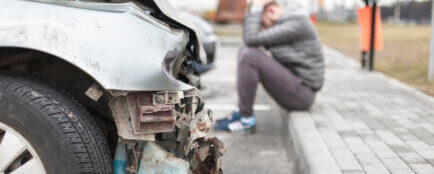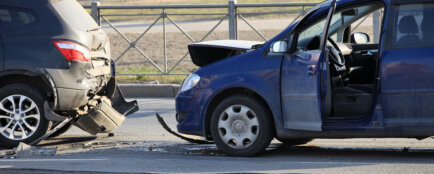General principles of compensation
The general principles of damages were discussed in detail in our earlier article. Let us summarise at least the four most important principles:
The prerequisite for damages is
- the wrongful act,
- the occurrence of the injury,
- causation,
- fault (intentional or negligent).
Compensation for damages covers the actual damage and what the injured party has lost, i.e. lost profits. The damage shall be compensated by restoring it to its previous state and, if this is not possible, the damage shall be paid in money.
Compulsory liability
In the vast majority of road accidents, insurance companies come into play. This is due to the fact that every vehicle operator is obliged to take out so-called third-party insurance(compulsory insurance), which then covers any damage. This obligation is imposed regardless of whether the car is actively used or whether it is sitting uselessly behind the house. If for some reason the owner of the car is late in paying the compulsory liability insurance, he does not have to worry. If he forgets to make the payment, he will receive a reminder.
Of course, we can still meet people who do not have compulsory liability insurance despite the legal obligation. However, in the event of an accident, they risk both a hefty fine and having to pay compensation out of their own pocket.
The amount of compulsory insurance is influenced by a number of factors relating to the car (type, performance, year of manufacture, make, etc.) and also the policyholder (age, place of residence, bonuses and malus). It is also influenced by the range of services offered, i.e. various supplementary insurances and additional insurances.
Thus, by taking out third-party liability insurance (i.e. by taking out compulsory third-party liability insurance), the insured has the right to have the insurer pay for the damage for which the victim is liable. The amount of damages paid is based on the limits set out in the insurance contract.
Although compulsory liability insurance is primarily intended to cover damage caused to another person’s property, it is thanks to additional insurance that you can also be protected in the event of damage to your own car.
What to do if you cause a car accident?
If you have been unlucky enough to be involved in a car accident, your next course of action depends on the damage caused. If the damage to the parties involved does not exceed CZK 200,000 and if there is no damage to the health or property of a third party, then it is not necessary to call the Czech Police. In such a case, it will be decisive what the parties themselves conclude and state about the accident and its cause. It is necessary to fill in the relevant insurance company’s report and state who was at fault for the accident. It is advisable to document everything, for example by taking pictures on a mobile phone.
If the Police of the Czech Republic are called to the accident, it is their investigation and conclusions that form the basis for the actions of other authorities, such as the courts or insurance companies. The police either deal with the matter on the spot, e.g. by imposing a block fine, or refer the matter to an administrative authority for misdemeanour proceedings. However, once you have paid the block fine, you have admitted your guilt and there is no remedy.
When to call the police?
Always call the police:
- if damage to any of the vehicles exceeds CZK 200,000 (including the goods being transported),
- a traffic accident where people are injured or killed,
- if the accident causes any damage to third party property, e.g. damage to a parked vehicle, the fence of a family house, a collision with a public lighting pole, etc,
- if one of the parties refuses to make a record or if the parties do not agree on the fault,
- where the accident damages a road or destroys or damages a part or accessory of a road (traffic sign, bollards, etc.) or damages a public utility (equipment at level crossings, etc.) or the environment (spillage of operating fluids, etc.),
- if you yourself are unable to restore the flow of traffic after an accident.
However, for more serious traffic accidents, the matter falls within the jurisdiction of the court, which will decide on the fault (e.g. for the offence of criminal damage to health, endangerment under the influence of an addictive substance, etc.) and the possible punishment.
The assessment of fault or contributory fault may have a significant bearing on the damages to be paid to the parties. It is therefore worthwhile to use legal services and consult everything in advance.
Are you solving a similar problem?
Are you dealing with compensation in connection with a car accident?
Describe your problem online. We will assess your case and draft a proposal for legal services to resolve it within 24 hours. If you then decide to entrust its solution in our hands, you have the drafting free of charge.
I want to consult
- When you order, you know what you will get and how much it will cost.
- We handle everything online or in person at one of our 6 offices.
- We handle 8 out of 10 requests within 2 working days.
- We have specialists for every field of law.
Accident report and certificate of involvement in an accident
The first step after ensuring your safety and calling the police, if necessary, is to fill in an accident report. This is a standardized form from insurance companies that lists the circumstances of the accident, the parties involved, and the damages incurred. This document is crucial to how compensation will subsequently be assessed following a car accident.
If the police are present at the scene, you will also receive a certificate of involvement, which serves as official proof that you were involved in the accident. Keep this document carefully – you will need it both for the insurance company and, if necessary, for further proceedings.
Tip for article
Tip: If the accident occurred in the course of or in direct connection with employment, compensation will be subject to the Labour Code, which we have discussed in more detail in our article.
Compensation after an accident from the perspective of the at-fault party
As the person at fault in a car accident, you don’t usually have to pay out of your own pocket. Compulsory liability compensation is a basic principle that protects you. The insurance company will pay for repairs to the victim’s vehicle, property damage and personal injury from your compulsory liability insurance.
But beware of the limits: if the amount of damage exceeds the agreed limit or if the insurer proves that you were under the influence of alcohol or drugs, it can claim so-called recourse compensation – that is, a refund of the money paid out.
Budget compensation is also a common issue. The injured person can get the money directly into their account and arrange the repairs themselves. For the at-fault party, this does not change anything – it is still compensation from the compulsory liability insurance.
Out-of-court settlements after a car accident
If the accident is minor and the victim is willing to settle the matter without unnecessary bureaucracy, you can agree on an out-of-court settlement after the accident. Typically, these are situations where the damage is minor and both parties agree on an amount that the at-fault party will pay directly.
However, we advise caution here too – always have written confirmation of payment, ideally with the victim’s signature, to avoid further claims later. If the damage is more severe, it is better to use a traditional insurance claim, which is safer.
What the victim is entitled to and how it relates to the guilty party
From the perspective of the at-fault party, it is good to know what the victim is entitled to in a car accident. Typically, this includes:
-
vehicle repair or replacement value in the event of total loss,
-
the cost of hiring a replacement vehicle,
-
loss of earnings if the accident has prevented them from working,
-
compensation for pain and suffering and permanent injuries,
-
compensation for damaged personal belongings, if applicable.
The insurance company can pay a significant amount of money and it pays to know that it all comes from your liability insurance.
Amount of compensation in a car accident
Many drivers are also interested in how the amount of compensation in a car accident is determined. Insurance companies base this on tables, expert reports and price lists for repair work. They also take into account the so-called depreciation – that is, the wear and tear on the vehicle. This means that the injured party does not always get the full price for new parts, but the amount reduced by normal wear and tear.
In practice, the victim may therefore receive less than he or she expected. This is a frequent subject of car accident compensation reviews, where people share their experiences with insurance companies.
Summary
Frequently Asked Questions
When and how is the accident report filled in?
The accident report is a basic document that is filled in at the scene of the accident. It is used for minor accidents where the damage does not exceed CZK 200 000, no personal injury has occurred and no third party property has been damaged. The insurance company’s form contains information about the parties involved, the vehicles and the circumstances of the accident. It serves as a basis for compensation from compulsory liability insurance, so it is important to fill it in truthfully and to support it with photo documentation.
When to call the police to an accident and when is it not necessary?
The police must be summoned if the damage to vehicles and transported items exceeds CZK 200,000, injury or death occurs, damage to other people’s property occurs (e.g. to a parked car or road signs), or if the parties do not agree on the culprit and refuse to sign a record. In other cases, it is sufficient to draw up an accident report and submit it to the insurance company.
What is a certificate of involvement in a traffic accident and what is it for?
If the police are called to the scene of the accident, they will issue a certificate of involvement to everyone involved. This document is official proof that you were involved in the accident and is necessary for further dealings with the insurance company or the court. So keep it carefully – it can be a key piece of evidence when making a claim for compensation after a car accident.
How does out-of-court settlement work after a car accident?
Out-of-court settlements are a quick way to resolve minor accidents without complicated paperwork. Typically, this is where the parties agree on a specific amount to be paid by the at-fault party to the victim on the spot. However, it is always necessary to have written confirmation of payment so that the victim does not make further claims later. For larger damages, it is preferable to use the classic compulsory third party liability insurance, which is safer and more legally certain.
What am I entitled to in a car accident and how is the amount of compensation determined in a car accident?
The victim of a car accident has the right to have the vehicle repaired or its value replaced in the event of total damage, the cost of a replacement vehicle, lost earnings, pain and suffering, permanent damage and compensation for destroyed personal belongings. Compensation for damages under compulsory liability insurance is calculated in accordance with expert reports, tables and price lists for repairs, with so-called depreciation applied – i.e. taking into account the wear and tear of the vehicle. Therefore, the injured party will not always receive the full price of new parts, but an amount corresponding to the age and condition of the car. This is also why car accident compensation reviews often appear in practice, where people share their experiences with insurers and the amount of compensation.




